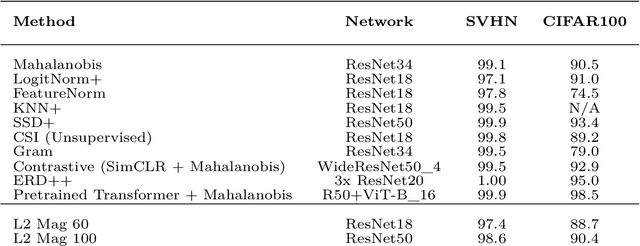Bernhard Rabus
Simple High Quality OoD Detection with L2 Normalization
Jun 07, 2023



Abstract:We propose a simple modification to standard ResNet architectures during training--L2 normalization over feature space--that produces results competitive with state-of-the-art Out-of-Distribution (OoD) detection performance. When L2 normalization is removed at test time, the L2 norm of feature vectors becomes a surprisingly good proxy for network uncertainty, whereas this behaviour is not nearly as effective when training without L2 normalization. Intuitively, familiar images result in large magnitude vectors, while unfamiliar images result in small magnitudes. Notably, this is achievable with almost no additional cost during training, and no cost at test time.
Inducing Early Neural Collapse in Deep Neural Networks for Improved Out-of-Distribution Detection
Sep 28, 2022



Abstract:We propose a simple modification to standard ResNet architectures--L2 regularization over feature space--that substantially improves out-of-distribution (OoD) performance on the previously proposed Deep Deterministic Uncertainty (DDU) benchmark. This change also induces early Neural Collapse (NC), which we show is an effect under which better OoD performance is more probable. Our method achieves comparable or superior OoD detection scores and classification accuracy in a small fraction of the training time of the benchmark. Additionally, it substantially improves worst case OoD performance over multiple, randomly initialized models. Though we do not suggest that NC is the sole mechanism or a comprehensive explanation for OoD behaviour in deep neural networks (DNN), we believe NC's simple mathematical and geometric structure can provide a framework for analysis of this complex phenomenon in future work.
 Add to Chrome
Add to Chrome Add to Firefox
Add to Firefox Add to Edge
Add to Edge